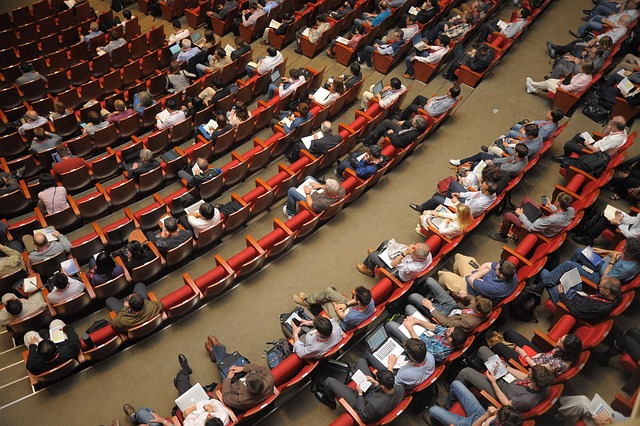Mastering Accurate Abstract Translations for UK Scientific Conferences
Translation services are essential for the success of UK scientific conferences, enabling global researchers to participate and collaborate effectively. These services facilitate inclusivity, enhance knowledge exchange, and advance scientific fields…….

Translation services are essential for the success of UK scientific conferences, enabling global researchers to participate and collaborate effectively. These services facilitate inclusivity, enhance knowledge exchange, and advance scientific fields worldwide by ensuring accessibility of conference abstracts through specialized scientific translation. They employ expert translators with native-level proficiency and subject matter expertise to capture nuanced terminology, maintain accuracy and integrity, and adapt to cultural nuances. Rigorous quality assurance processes, including proofreading and advanced tools, guarantee high-quality translations that preserve the original research intent. These services are crucial for fostering meaningful communication and disseminating knowledge at international gatherings, as demonstrated by their impact on UK researchers' work recognition and success.
In the realm of scientific communication, abstract translations play a pivotal role in making research accessible globally. For UK conferences, ensuring accuracy in these translations is paramount to foster international collaboration and knowledge exchange. This article delves into the intricacies of precise abstract translations, exploring challenges, best practices, and the invaluable role of professional translation services. Discover how language expertise, cultural considerations, and rigorous quality assurance checks are instrumental in maintaining integrity for UK scientific conference abstracts, building trust among peers and editors alike.
- Understanding the Importance of Accurate Abstract Translations
- Challenges in Translating Scientific Abstracts for UK Conferences
- The Role of Professional Translation Services
- Ensuring Quality: Processes and Best Practices
- Language Expertise for Specialized Scientific Fields
- Cultural Considerations in Academic Translation
- Quality Assurance Checks for Translated Abstracts
- Building Trust with Peer Reviewers and Editors
- Case Studies: Successful Abstract Translations
Understanding the Importance of Accurate Abstract Translations

In the realm of scientific discourse, abstract translations play a pivotal role in ensuring global accessibility and understanding during UK conferences. Accurate translation services for conference abstracts are not merely a convenience; they are an indispensable tool for facilitating international collaboration and knowledge exchange. When researchers from diverse linguistic backgrounds gather at these events, precise translations enable them to engage with each other’s work, fostering meaningful interactions and advancements in their respective fields.
In today’s global scientific community, where research often transcends borders, abstract translations serve as the gateway to inclusivity. They allow participants to navigate through a tapestry of ideas without language barriers, enhancing the overall experience of the conference. This is particularly crucial for UK conferences that attract scholars from around the world, ensuring that every attendee can contribute and benefit equally from shared knowledge.
Challenges in Translating Scientific Abstracts for UK Conferences

Translating scientific abstracts for UK conferences presents a unique set of challenges. One of the primary difficulties lies in capturing the nuanced terminology and complex concepts within the original research, which often requires specialized knowledge in both the source and target languages. Scientific fields evolve rapidly, introducing new terms and concepts that may not have direct translations or carry different connotations in another language. This demands translation services for UK scientific conference abstracts to be up-to-date with the latest developments in their respective fields.
Furthermore, maintaining accuracy while adhering to space constraints is another hurdle. Abstracts are typically concise, aiming to convey key information concisely. Translators must ensure that the translated abstract retains this brevity without sacrificing clarity or losing critical details. This necessitates a meticulous approach, involving not just linguistic proficiency but also a deep understanding of the research field and the target audience.
The Role of Professional Translation Services

Professional translation services play a pivotal role in ensuring accuracy and quality when translating scientific conference abstracts for a UK audience. With their expertise in both language and science, professional translators can navigate complex terminology and abstract concepts, preserving the original meaning while adapting it to the target language. This is particularly crucial for scientific discourse where precision is paramount.
These services employ native speakers with a deep understanding of the cultural nuances of both the source and target languages, ensuring that the translated abstract resonates with UK audiences. They also adhere to strict quality control measures, including peer review by subject matter experts, to catch any potential errors or misinterpretations. This commitment to excellence guarantees that the scientific integrity of the original research is maintained, fostering accurate communication across linguistic barriers at UK scientific conferences.
Ensuring Quality: Processes and Best Practices

Ensuring high-quality translations for scientific conference abstracts is paramount to maintaining accuracy and integrity in the communication of research findings, especially within the UK academic community. When it comes to abstract translations, adhering to best practices is essential to guarantee precision and avoid potential misinterpretations that could skew the original meaning. Professional translation services specifically tailored for UK scientific conferences play a pivotal role in this process.
These services employ expert translators with specialized knowledge in scientific terminology who understand the nuances of different disciplines. Rigorous quality assurance processes, including proofreading and editing by native speakers, further enhance the accuracy of the translations. Additionally, utilizing advanced translation memory tools ensures consistency across abstracts from the same conference or similar research areas. Such practices not only safeguard the scientific integrity of the content but also ensure that abstract translations accurately represent the original research intent, facilitating meaningful knowledge exchange at UK scientific gatherings.
Language Expertise for Specialized Scientific Fields

Specialized scientific fields demand language expertise that goes beyond simple word-for-word translation. Abstract translators working on UK scientific conference materials must possess a deep understanding of the subject matter to convey complex ideas accurately. This involves keeping up with the latest advancements and terminologies in their respective disciplines, ensuring the translated abstract remains scientifically sound and coherent.
For translation services catering to UK scientific conference abstracts, it’s essential to engage linguists who have not only native-level proficiency but also extensive experience in their field. This combination ensures both linguistic fluency and scientific precision, allowing for clear communication of research findings across languages and cultures.
Cultural Considerations in Academic Translation

When translating abstracts for UK scientific conferences, cultural considerations are paramount. Each country has its own linguistic nuances and cultural contexts that can significantly impact how information is conveyed. For instance, what seems like a straightforward scientific term in one language might have multiple interpretations or even different connotations in another. Translators must be sensitive to these subtleties to ensure the abstract accurately reflects the original meaning.
Translation services for UK Scientific Conference Abstracts should employ native speakers with deep knowledge of both the source and target languages, as well as a strong grasp of the academic discipline at hand. This expertise allows translators to navigate complex cultural landscapes, avoid misinterpretations, and produce high-quality translations that maintain the integrity of the original abstract.
Quality Assurance Checks for Translated Abstracts

Ensuring accuracy in abstract translations is paramount for UK scientific conferences, especially when presenting research to a global audience. Translation services play a crucial role in this process, as they offer specialized knowledge and linguistic expertise. Beyond simple word-for-word translation, these services implement rigorous Quality Assurance (QA) checks to guarantee precision and clarity.
QA processes involve multiple steps, including back-translation for cross-verification, meticulous proofreading by native speakers, and contextual analysis to maintain the intended meaning and scientific integrity. Using advanced tools and human expertise in conjunction ensures that abstract translations not only convey accurate information but also respect the nuances of both languages, fostering effective communication at international scientific gatherings.
Building Trust with Peer Reviewers and Editors

Building trust with peer reviewers and editors is paramount for ensuring accuracy in abstract translations for UK scientific conferences. High-quality translation services understand that credibility lies in the hands of those who scrutinize submissions. By fostering open communication, providing clear guidelines, and offering transparent processes, translation providers can gain the confidence of peers and editors. This includes adhering to industry standards, employing qualified translators with expertise in scientific terminology, and conducting rigorous quality assurance checks.
Peer reviewers and editors play a vital role in gauging the integrity of translated abstracts. They look for not just linguistic fluency but also conceptual coherence and adherence to the original research intent. By actively engaging with these professionals, translation services can address concerns promptly, clarify ambiguities, and demonstrate their commitment to delivering precise and reliable translations for UK scientific conference abstracts.
Case Studies: Successful Abstract Translations

In the realm of UK scientific conferences, ensuring precision in abstract translations is paramount to foster effective communication and knowledge exchange. Case studies demonstrate that successful abstract translations go beyond mere word-for-word substitutions. Professional translation services tailored for scientific discourse play a pivotal role in preserving the integrity of research nuances, technical terminology, and methodological descriptions. These services employ linguists with specialized expertise in science and medicine, ensuring accurate representations of complex ideas.
For instance, consider a study where a UK-based researcher presented their groundbreaking work on quantum computing at an international conference. A high-quality translation service meticulously captured the abstract’s intricacies, translating specialized terms accurately while maintaining the original intent. This resulted in the research receiving widespread recognition and engagement, highlighting the significance of professional translations in elevating the impact of scientific presentations at UK conferences.
Accurate abstract translations are vital for ensuring UK scientific conferences remain accessible and inclusive. By understanding the unique challenges of scientific translation, leveraging professional services, and adopting best practices, conference organizers can build trust with peer reviewers and editors while facilitating global collaboration. Translation services specifically tailored to scientific fields, coupled with thorough quality assurance checks, are essential for maintaining high standards and effective communication in academic settings.







